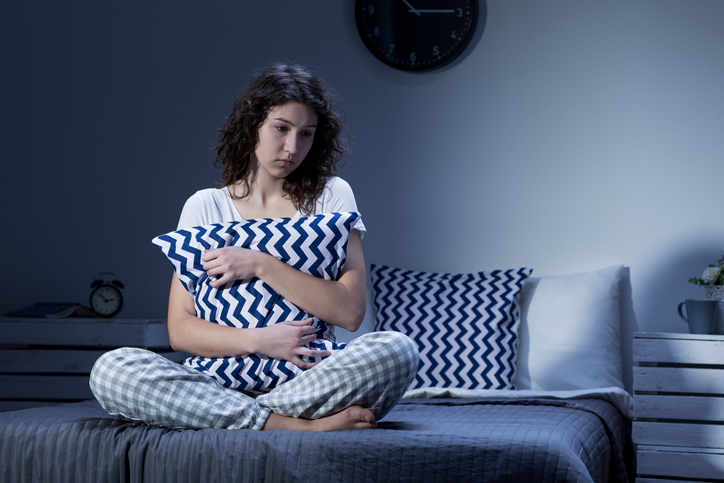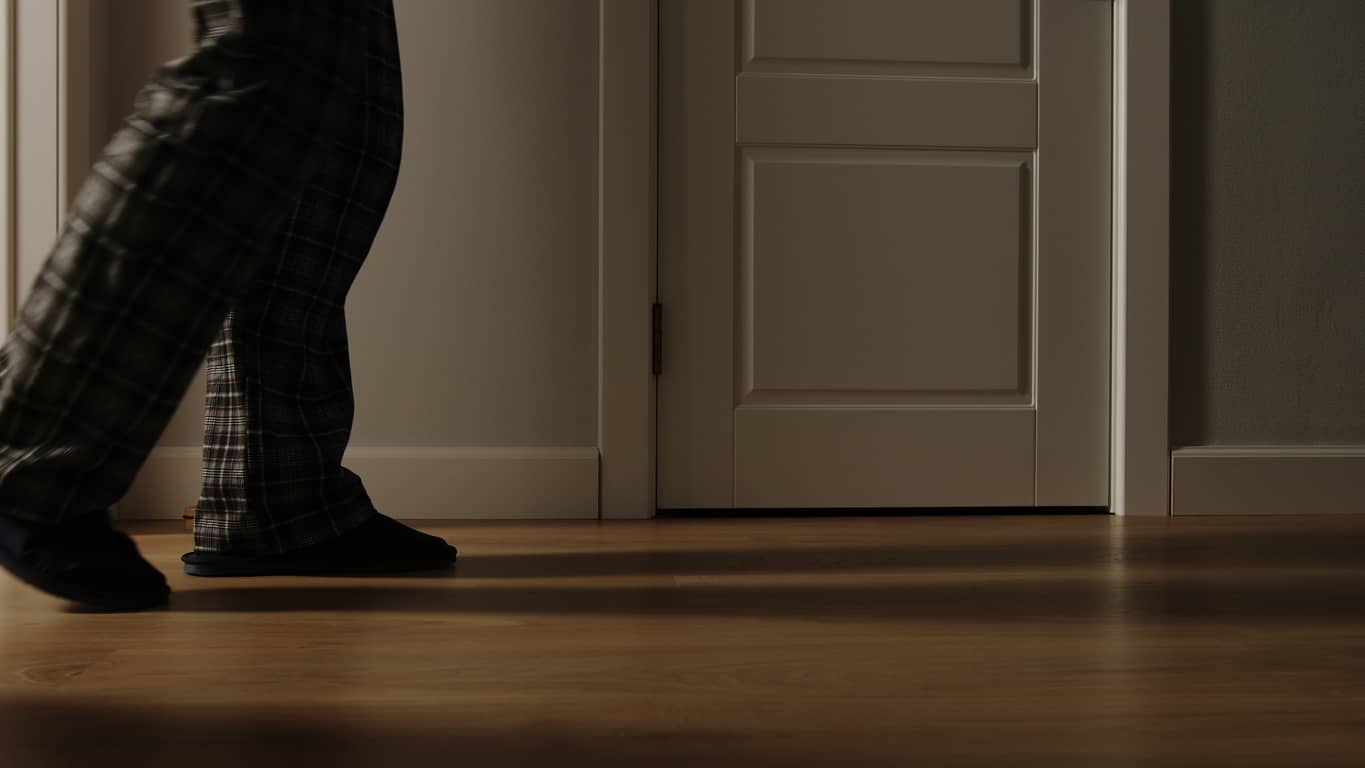Have you ever woken up feeling terrified, or with your partner telling you that you’ve been shouting or thrashing around in your sleep? This is a night terror. They’re sometimes called sleep terrors, and doctors describe them as a type of parasomnia – an abnormal sleep behaviour.
It’s not clear exactly what causes this sleep problem but there are some things that might trigger it. And it can be a really frightening experience for you or someone you’re sharing a bed or a room with – not to mention leaving you feeling less able to get back to sleep if you wake up.
Read on to discover why you might be having night terrors, what you can do about them and when to see a doctor for help.
Who gets night terrors?
Around 35% to 40% of children have night terrors, while only around 2% of adults experience this unpleasant sleep problem. People with a family history of night terrors or sleepwalking are also more likely to get them.
Generally, night terrors are thought of as harmless. But, they can be very scary and can cause worry if you have them regularly or start having them out of the blue.
Night terror symptoms: what happens?
Night terrors most often happen in the first half of a night’s sleep and can last for a few minutes or even up to 30 to 40 minutes in some cases. They can happen just once or multiple times in one night but rarely happen during naps. Sometimes you can wake up suddenly from a night terror, and other times you’ll go back into normal deep sleep without waking up at all.
As well as feeling very frightened during an episode of night terrors you may also:
- scream or shout in your sleep
- thrash your arms and legs around
- suddenly sit up in bed, get out of bed or run around your home will still asleep
- stare wide-eyed while still asleep
- find it hard to wake up fully
- feel sweaty, start breathing heavily, and have a racing pulse, flushed or pale face and dilated pupils
- suddenly wake up feeling very scared
- sleepwalk
- be aggressive when someone tries to wake you up
- be confused when you wake up or are woken up
- be difficult to comfort
Although night terrors are very scary at the time, in most cases you’ll have no or very little memory of it having happened when you wake up in the morning. A partner or someone in your room or household who has heard you and been woken by it is more likely to remember and have a disturbed night or worries about the person as a result.
Night terrors vs nightmares: what’s the difference?
Although the names may sound similar, night terrors and nightmares are in fact very different. This is because they tend to happen at different stages in your sleep cycle. As well as experiencing the symptoms listed above during night terrors, and not during nightmares, there are other key differences:
- night terrors happen in the first half of sleep whereas nightmares tend to happen in the latter half
- night terrors can be difficult to wake someone up from, nightmares aren’t
- night terrors rarely involve a dream - you only have fear - but nightmares are frightening or scary dreams
- often you won’t remember having a night terror but you may remember your nightmares
- during a night terror you might make sounds and thrash about, but this is rarely the case with nightmares

What causes night terrors in adults?
It’s not exactly clear what causes night terrors but there are some things that can make it more likely, or trigger it:
- sleep deprivation or disruption
- extreme tiredness
- stress
- fever
- drinking alcohol
- mental health and mood disorders like anxiety, depression and post-traumatic stress disorder (PTSD)
- medical conditions like restless leg syndrome (RLS) and migraines
- other sleep disorders like sleep apnoea
Are there any health risks from night terrors?
As well as being a strange or frightening experience if you remember them, night terrors can:
- disturb your sleep and make you feel excessively sleepy during the day. This can make it hard to function in your work or do everyday tasks
- potentially cause an accident or injury if you sleepwalk, or end up hitting someone you share a bed with if you thrash about - although in most cases, night terrors aren’t considered dangerous
- cause tension and distress if you’re in a relationship and feel embarrassed about your night terrors, or are disturbing your partner’s sleep
How to reduce any risks from night terrors
- if you find you’re very tired as a result of your night terrors you may want to avoid activities like driving to reduce your risk of an accident
- if you sleepwalk when you have night terrors, it's a good idea to make sure you take care of anything that could cause you to hurt yourself. This might look like putting safety gates on stairs, moving tripping hazards and putting fragile belongings in a safe place out of the way
- being very tired can make you irritable and snappy. Talk to anyone you interact with a lot – colleagues, your partner, family and friends – to explain you’re struggling with getting a good night’s sleep, so don’t mean to be rude if and when you’re in a bad mood around them
How to stop night terrors
If you’re having a hard time with night terrors, these self care tips might help:
- get enough good quality sleep – tiredness can trigger night terrors so it makes sense that getting more sleep would help. But how can you do that when you’re struggling with night terrors? Try sticking to a regular sleep schedule, practice good sleep hygiene, and read these tips to help you get better sleep
- try to de-stress and relax – as you now know, stress can also be a trigger of night terrors, so do what you can to relax and unwind before bed to lower your stress levels and see if this reduces how often you have episodes
- keep a diary – keeping track of your night terrors in a diary or in the Healthily app may help you notice patterns and work out what’s triggering them. As you probably won’t remember your night terrors, this tip is much easier to follow if you live with someone who can tell you when they happen. If night terrors are a recurring problem at a similar time each night, it may be helpful to be woken 15 minutes before the usual time they happen, to prevent them happening in the first place
There’s not much evidence to support the use of any foods, essential oils, vitamins or alternative medicines in preventing night terrors specifically. However, if you find natural approaches such as yoga, essential oils or acupuncture help to reduce whatever triggers your night terrors, it makes sense to carry on as long as your doctor says it’s safe to do so.
If you’re struggling with night terrors, charities such as The Sleep Charity may be able to offer advice and support.
How to help someone who’s having a night terror
Witnessing someone having a night terror can be very frightening and you might not know what to do to best help them. It can be tempting to give the person a shake to try to wake them up but often this can make them feel agitated and confused.
Instead, stay with them until the terror passes. If they don’t wake up, they’re unlikely to remember the episode in the morning. If they do wake, the best thing you can do is offer comfort and speak calmly to help them feel soothed and less afraid.
What to do if you wake up from having a night terror
If you wake up from a night terror but are alone, you might find it difficult to get back to sleep. Have a look at our article on getting back to sleep for some tips to help you relax and nod off again.
When to see a doctor
If you’re struggling with tiredness, worried about accidents or finding night terrors are putting stress on your relationship, make an appointment to see your doctor.
You should also see your doctor if you:
- are having more than 2 episodes a week
- have several episodes in a night
- have or might injure yourself during an episode
- also sleepwalk
- feel anxious about your symptoms or are scared to go to sleep
- you feel very sleepy during the day and it’s affecting your daily routine
How are night terrors diagnosed?
Most often, night terrors are diagnosed by your doctor:
- listening to you talking about your symptoms
- asking about your family medical history
- doing a physical examination
To help get the best from your consultation it could be useful for you to:
- keep a sleep diary before speaking to your doctor or a sleep specialist. This is so you can more accurately share with them how often you have night terrors, what your sleep routine looks like and any patterns you think there might be in terms of a cause
- if you have a partner, ask them to film you if it happens often, to show the doctor your symptoms
- talk to other family members to find out if there is a family history of night terrors or sleep walking
Your doctor may diagnose you with night terrors straight away, based on what you tell them. If the cause of your night terrors is unclear, your doctor may run some more tests to look for underlying medical conditions. They may also refer you to a sleep specialist who may run a sleep study to try to rule out or diagnose any sleep disorders that could be the cause. If you need to be referred for further checks, it’s likely to take longer to get a diagnosis.
Doctor-led treatments
If self-care isn’t helping to reduce the number of episodes you have, your doctor or sleep specialist may be able to help by:
- treating any underlying health conditions or sleep disorders
- referring you to have some counselling or therapy if your night terrors might be causes by a mental health condition such as anxiety, stress, depression or PTSD
- prescribing medications such as benzodiazepines or certain antidepressants
Tip from a doctor
Witnessing night terrors in your partner can be very distressing. In fact, it’s often much harder on you than them. It can be helpful to remember that night terrors are unlikely to cause them any harm and that they won't usually be affected when they wake up in the morning. If it's frequently disturbing your sleep and putting strain on your relationship, you might want to consider sleeping separately to give yourself a good night's sleep and rejuvenate. Just make sure your partner is in a safe space with nothing breakable in the room.







